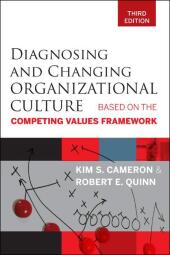 Neuerscheinungen 2011Stand: 2020-01-07 |
Schnellsuche
ISBN/Stichwort/Autor
|
Herderstraße 10
10625 Berlin
Tel.: 030 315 714 16
Fax 030 315 714 14
info@buchspektrum.de |

Kim S. Cameron, Robert E. Quinn
(Beteiligte)
Diagnosing and Changing Organizational Culture
Based on the Competing Values Framework. Contains a downloadable online version of the Management Skills Assessment Instrument and the Organizational Culture Assessment Instrument
3rd Ed. 2011. 288 p. 227 mm
Verlag/Jahr: WILEY & SONS 2011
ISBN: 0-470-65026-5 (0470650265)
Neue ISBN: 978-0-470-65026-4 (9780470650264)
Preis und Lieferzeit: Bitte klicken
The third edition of the best-selling book Diagnosing and Changing Organizational Culture offers a proven framework and methodology for helping managers and their organizations carefully analyze and alter their fundamental culture. This book contains validated instruments for diagnosing organizational culture and management competency, a theoretical framework for understanding organizational culture, and a systematic strategy for changing organizational culture and personal behavior.
Designed to be a hands-on resource, the book includes a wealth of instruments that leaders can use to plot their organization´s culture profile. Diagnosing and Changing Organizational Culture includes a management competency assessment instrument to help facilitate personal change in order to effectively support culture change. The book can also serve as an information source for explaining a robust framework of culture types. The Competing Values Framework is probably the most frequently applied framework in the world for assessing culture, and it has proved to be very useful to a variety of companies in clarifying the culture change process, as well as instigating significant managerial leadership improvement.
Filled with new examples and a step-by-step formula for organizational change, this thoroughly revised third edition also contains a downloadable online version of the Management Skills Assessment Instrument and the Organizational Culture Assessment Instrument.
Preface ix
Acknowledgments xv
The Authors xvii
1. An Introduction to Changing Organizational Culture 1
The Need to Manage Organizational Culture 2
The Need for Culture Change 9
The Power of Culture Change 14
The Meaning of Organizational Culture 18
Levels of Analysis 21
Caveats 23
2. The Organizational Culture Assessment Instrument 27
Instructions for Diagnosing Organizational Culture 28
Scoring the OCAI 33
3. The Competing Values Framework 35
The Value of Frameworks 35
Development of the Competing Values Framework 38
The Four Major Culture Types 41
Applicability of the Competing Values Model 51
Total Quality Management 56
Human Resource Management Roles 58
Corporate Missions and Visions 60
Culture Change over Time 64
Culture Change in a Mature Organization 68
Summary 70
4. Constructing an Organizational Culture Profile 73
Plotting a Profile 73
Interpreting the Culture Profiles 80
Summary 94
5. Using the Framework to Diagnose and Change Organizational Culture 95
Planning for Culture Change: An Example 97
Steps for Designing an Organizational Culture Change Process 101
Supplementing the OCAI Methodology 121
6. Individual Change as a Key to Culture Change 135
Critical Management Skills 136
Personal Management Skills Profi le 141
Personal Improvement Agendas 151
7. A Condensed Formula for Organizational Culture Change 159
Diagnosis 160
Interpretation 161
Implementation 162
Summary 163
Appendix A: Organizational Culture Assessment 165
Instrument: Definition, Dimensions, Reliability, and Validity
Appendix B: Psychometric Analyses of the 185
Management Skills Assessment Instrument
Appendix C: Hints for Initiating Organizational 209
Culture Change in Each Quadrant
Appendix D: Suggestions for Improving Personal 221
Management Competencies
Appendix E: Forms for Plotting Profiles 247
References and Suggested Reading 253
Index 261
Kim S. Cameron is William Russell Kelly Professor of Management and Organizations at the Ross School of Business, University of Michigan.
Robert E. Quinn is Margaret Elliott Tracy Collegiate Professor in Business Administration and professor of management and organizations at the Ross School of Business, University of Michigan.


